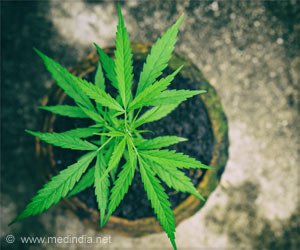The Well-Established Stars Amidst the Enigmatic Cannabis Compounds

But claims of a mystical experience have been greatly exaggerated, according to a University at Buffalo-led study published in the
).
THC-O-acetate is a semi-synthetic compound that’s derived from delta-8 THC, another cannabinoid that has garnered much interest in the last few years among curious consumers, as well as state legislatures leery of its potential dangers. (In New Jersey, where cannabis is legal, lawmakers are currently debating a bill that would ban delta-8 products.)
Advertisement
Unknown Cannabinoids of the Cannabis Plant
“THC-O-acetate has been getting a lot of attention because people are saying it’s stronger than regular THC and there are these claims that it produces psychedelic effects. We wanted to study this and see, if is there a psychedelic cannabinoid. Can we find evidence that THC-O-acetate has this effect? And the answer is, not so much,” says study lead author Daniel J. Kruger, PhD, research associate professor in UB’s School of Public Health and Health Professions and research scientist in the Department of Medicine in the Jacobs School of Medicine and Biomedical Sciences at UB.
Kruger and study co-author Jessica S. Kruger, Ph.D., clinical associate professor of community health and health behavior in UB’s School of Public Health and Health Professions, conducted a study last year that surveyed users’ experiences with delta-8 THC. Taking a look at THC-O-acetate was the next logical step.
There’s also a public health arm of their interest in this particular cannabinoid: It’s an acetate, and when acetates are heated they can produce ketene, a toxic gas. In 2019, more than 2,800 people were hospitalized and 68 deaths were reported due to a condition called “e-cigarette, or vaping, product use associated lung injury” (EVALI) after vaping products containing vitamin E acetate.
2018 Farm Bill Created Loophole
Congress’s passage of the Farm Bill in 2018 made growing hemp legal at the federal level. Essentially, hemp is cannabis that contains less than 0.3% THC, the chemical compound that creates the “high” that people feel. While it made growing hemp legal, the Farm Bill unintentionally created a loophole allowing manufacturers to produce and sell thousands of products containing CBD. Many are marketed with claims like “sleep aid,” “pain relief” and “pet calming.”
But such claims are often unvalidated, and little research has been done to better understand what’s in products that are being sold online, in gas stations, corner stores, and shops across the country.
“It opened up entirely new markets for cannabis companies and created a sort of gray market pathway,” says Daniel Kruger. “It’s kind of like the Wild West. There’s a huge demand for CBD products and companies have jumped in to supply this demand. Of course, they want to make a product that will stand out and get attention. Everyone’s got CBD, here’s something else.”
Enter THC-O-acetate
For the study, Kruger and his colleagues developed a survey that asked nearly 300 participants to indicate the extent to which they experienced the following when using THC-O-acetate: an altered sense of time, anxiety, difficulty concentrating, euphoria, hallucinations, pain relief, paranoia, and relaxation.
Participants also completed items from the Mystical Experience Questionnaire (MEQ), a classic instrument for assessing psychedelic experiences developed in the 1960s by Walter Pahnke. They were also asked which, if any, psychedelics they had used, such as LSD or psilocybin mushrooms.
When asked directly, 79% responded that using THC-O-acetate is “not at all” or “a little” of a psychedelic experience.
Participants’ responses were significantly below the threshold for a complete mystical experience, and those who had used classic psychedelics had lower scores on all MEQ dimensions. The most prominent experiences reported were moderate relaxation, euphoria, and pain relief.
Delving into the Uncharted Territory of Cannabis Compounds
So, why do some people report having a psychedelic experience with THC-O-acetate? Kruger says there are three likely explanations:
- It may be due to expectations based on what users have heard or read.
- Some users may have experienced a very intense high and thought it was psychedelic.
- The product may have contained a contaminant.
The latter is particularly troubling from a public health standpoint, researchers say. “People have to be careful,” Daniel Kruger says. “It’s possible that some of these extreme effects are the result of some sort of contamination, and that’s one of the real dangers of these products if you don’t know what’s in them.”
Some companies will include a QR code on the product label, directing consumers to a website that contains information on specifically what’s in the product. But many don’t.
“There’s tons of interest in delta-8 and THC-O-acetate, and lots of claims being made about them with virtually no research,” Daniel Kruger says. “They’re really new to the consumer market and cannabis still has this weird mix of policies where it’s illegal at the federal level, so we don’t have national regulations, certainly not the kind of testing you’d have with a prescription drug.”
Reference :
- THC-O-Acetate: Scarce Evidence for a Psychedelic Cannabinoid
– (https://www.tandfonline.com/doi/full/10.1080/02791072.2023.2230573)
Source: Eurekalert
Source link
#WellEstablished #Stars #Enigmatic #Cannabis #Compounds



